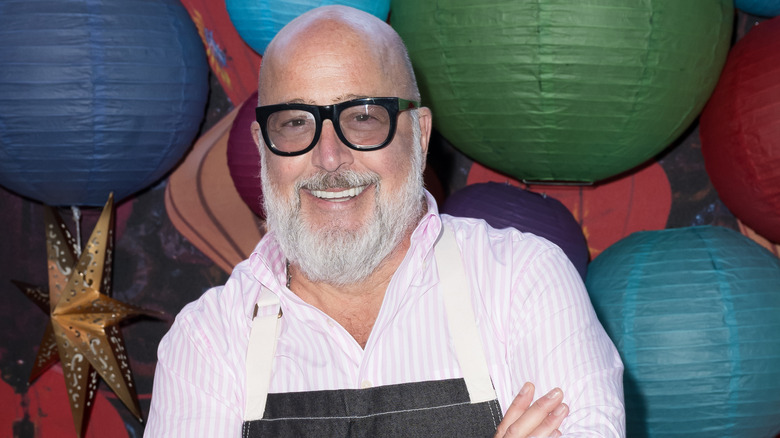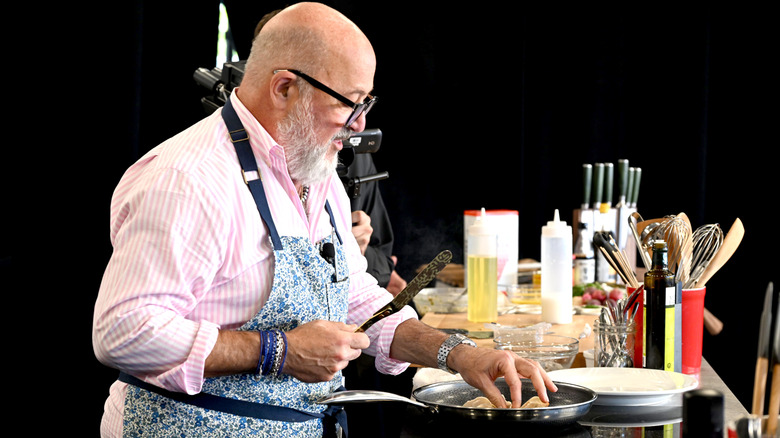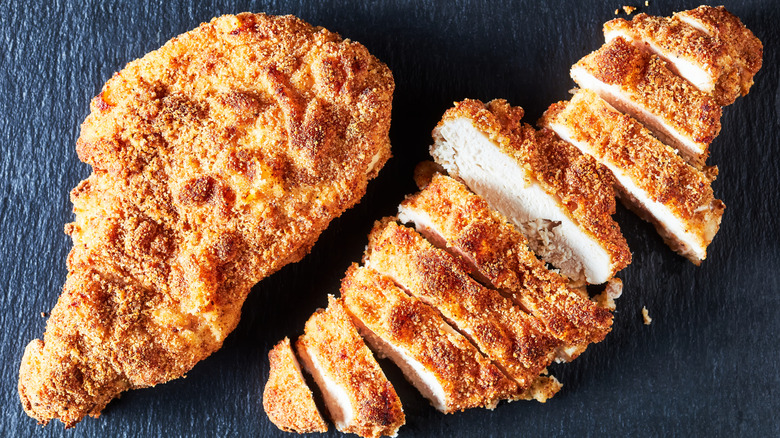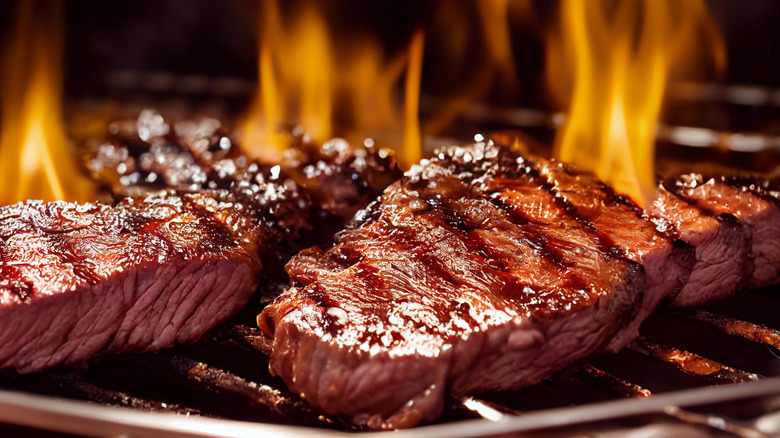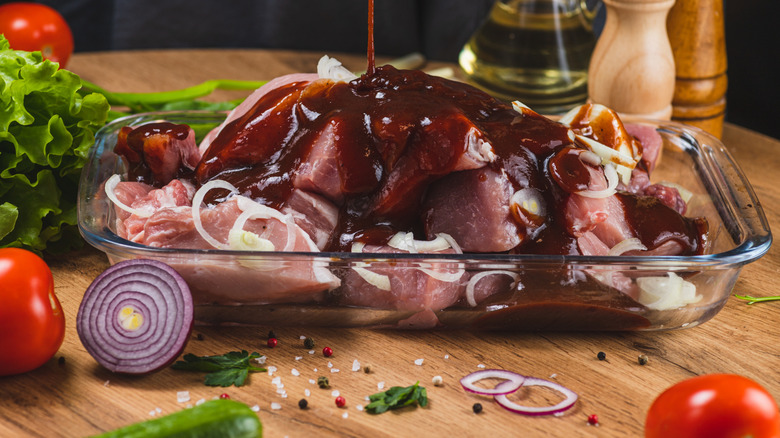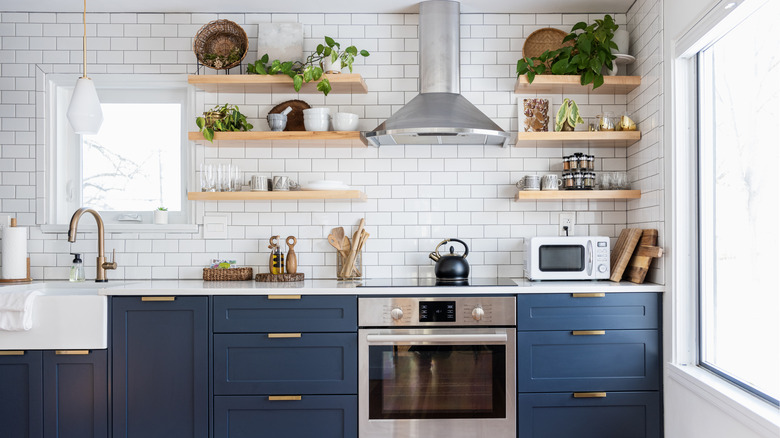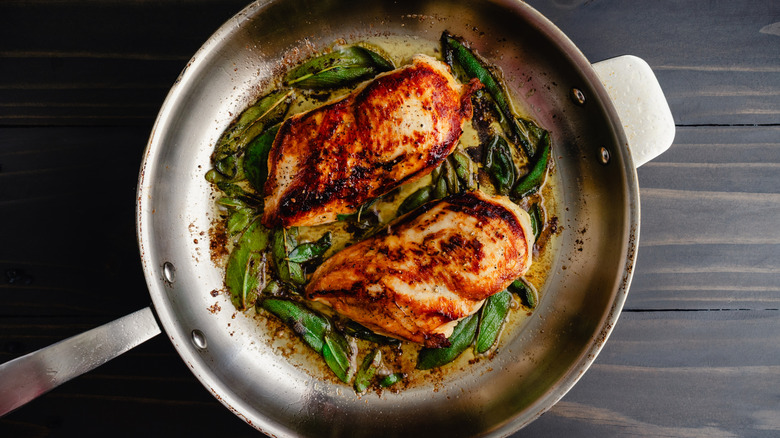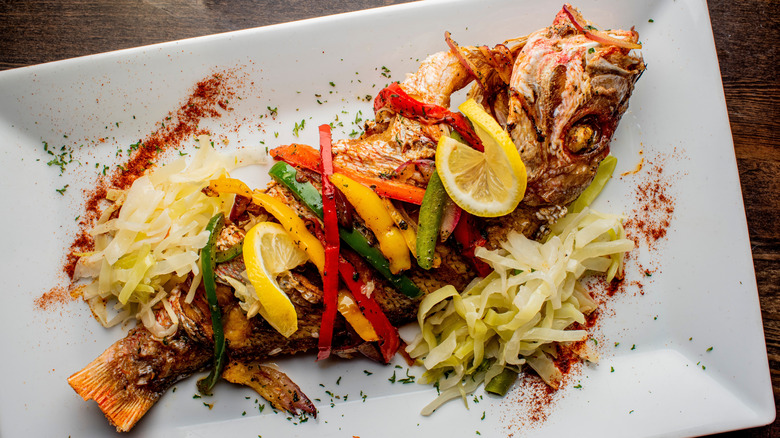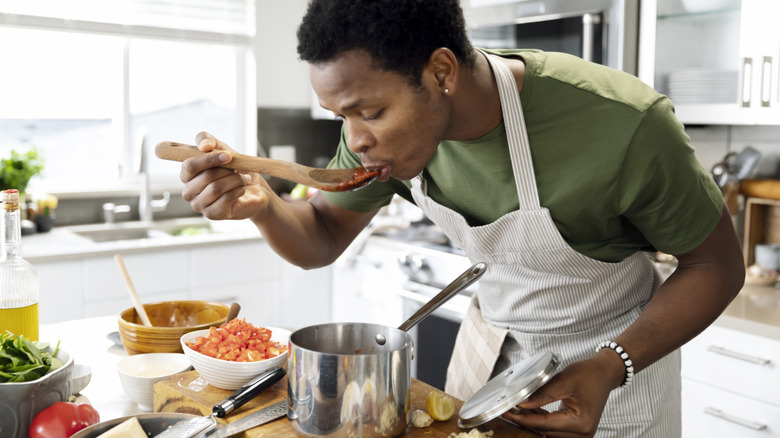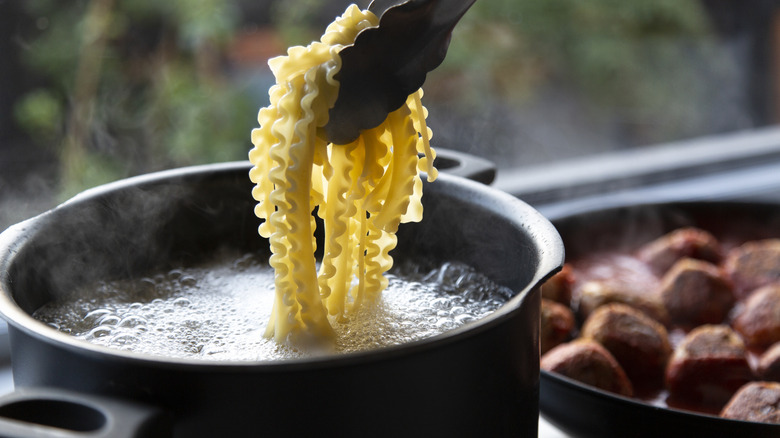14 Pro Cooking Tips From Andrew Zimmern You'll Wish You Knew Sooner
Many people love shock value in entertainment, which is why Andrew Zimmern's long-running television show "Bizarre Foods" was a major hit. Whether he was eating putrefied shark or coral reef worms, people couldn't look away even if their stomachs were begging them.
Although he's eaten some truly shocking dishes, his international travels have helped him develop robust taste buds and top-notch cooking skills. He's even been invited as a trusted judge on several popular cooking shows, including "Chopped," "Top Chef," and Guy Fieri's "Tournament of Champions." If you've been wanting to level up in the kitchen, turning to celebrity chefs can be fun and rewarding.
Zimmern has shared a lot of wisdom over the years, but some tricks are more practical for the average person than others. Here are 14 cooking tips that Andrew Zimmern wants all home cooks to know so they can enjoy vibrant meals with minimal waste.
Don't start cooking until you've completely read the recipe
Considering how hectic most people's schedules are, it's understandable if you feel like you have to rush through the cooking process, especially if you're already starving. However, Andrew Zimmern tells home cooks that it's always worth taking the time to read the entire recipe before you lift a finger.
Some recipes use a single ingredient at different points in the cooking process, and someone who's rushing could end up dumping everything in at the wrong time. Another common mistake is not having everything prepared at the right time.
For example, you may need to prepare and set aside a sauce that you can dip into as soon as your dish is ready. If you're craving animal style fries, nothing would be more depressing than having cold, soggy fries because your caramelized onions or dressing weren't ready yet.
Andrew Zimmern also says that you can learn a lot about the quality of the recipe if you pay attention to the details. The greatest recipes are tested several times to work out the flaws, and the language will reflect those efforts. A basic banana bread recipe could instruct the baker to mash their bananas, while a leveled-up recipe may say to use a fork or potato masher instead of a blender to get the best texture.
Meal prepping should never be boring if you learn how to repurpose ingredients
Although there are plenty of ways to eat healthily, fitness enthusiasts have a reputation for only eating boiled chicken and white rice without any seasoning. If you're turned off from meal prepping because you're afraid of the monotony, Andrew Zimmern has plenty of tricks that can make you a believer.
Zimmern is passionate about reducing food waste, which is why you'll see many videos on his social media accounts of interesting recipes he's made with various scraps and leftovers. In a Facebook video, Zimmern makes a luscious shrimp bisque that contains shrimp shells, vegetable ends, and leftovers that some people would normally throw out. He believes that a little creativity can go a long way toward enjoying all kinds of flavors.
If you roast a bunch of vegetables and cook a couple of pounds of ground beef before your work week, you could eat a variety of fun, time-saving meals. With these two base ingredients, you can whip up a burrito bowl, salad, soup, pasta dish, tacos, and more in a flash. Try some of Andrew Zimmern's recipes to get a better grasp on how to use a few simple ingredients in unique and satisfying ways.
Make fried dishes less messy by breading ingredients in a paper bag
One thing that can scare home cooks into ordering takeout is a big mess. Andrew Zimmern's clever paper bag hack for frying foods will help you avoid soggy takeout and crumbs all over your kitchen. Instead of having a bowl of beaten eggs and two plates of flour and breadcrumbs, use one or two paper bags for your dry ingredients.
If you're dredging your meat in flour first, dump your pieces in a paper bag filled with flour and give it a good shake. Carefully remove each piece, place it in the beaten eggs, then put the meat back into the flour bag or a second bag filled with breadcrumbs. You can adapt this method based on how many dry ingredients and coatings are needed for the recipe.
Now you don't need to worry about using one hand for wet ingredients and the other for dry ingredients. Your hands can stay clean, and best of all, you can just toss the bags into the trash for a speedy cleanup once you're done.
Grilling perfect steaks doesn't have to be complicated if you remember a few crucial tricks
Grilling for yourself is already intimidating enough, but feeding a crowd puts your cooking reputation on the line. Andrew Zimmern has a few genius tips that can help you grill perfect meat every time.
His first tip might surprise you, which is to choose cuts of meat with the bone still attached. Not only will the bone help add more flavor to the meat, but bone-in meats also take longer to cook. This gives the meat more time to develop a delightful texture as it cooks over the fire. To avoid overcooking your meat, Zimmern says that you can use a thermometer to be precise or learn how to feel the texture for proper doneness. To do this, relax your hand and squeeze the skin between your thumb and pointer finger. This is what raw meat feels like.
If you ball your hand into a fist and squeeze the same spot, it will feel like well-done meat. Zimmern says that you should aim for a texture that's right in the middle. When it comes to lid or no lid, Zimmern is firmly on the side of not using a lid. If you keep the grill hot enough, you'll develop a classic char, but using a lid will bake the meat rather than grill it. Always let your meat rest for at least 10 minutes so you don't lose any of those delicious, hydrating juices.
Cooking with wine can amplify your flavors, but don't use wine you wouldn't enjoy drinking
One tip that seems obvious but gets overlooked often is avoiding cooking with wines that you wouldn't want to drink. If it doesn't taste good when you sip it, it definitely won't make the dish you're cooking taste great, either. Andrew Zimmern said in a cooking lesson, "When you cook with wine, invariably you're reducing it. When you reduce it, you magnify the good flavors, but also the bad, so you want to make sure that you're cooking with really good wines."
This means that you should always try your wine before you add it to the dish if you're using it for the first time. Your favorite bottles will always be safe to use without a taste test, but you can still feel free to pour yourself a glass if it makes the cooking process more enjoyable. Zimmern's personal favorites are Rhone wines from Guigal.
The good news is that you don't have to spend a fortune since there are plenty of incredible, cheap wines that will elevate any dish. Once your sauce is reduced, those lovely notes you pick up on when you sip the wine will taste even bolder.
A simple marinade can get you out of your cooking rut
Chicken breasts are a popular staple because they're lean and packed with protein, but they can become boring quickly if you don't switch up the flavors. Marinades can work wonders for all kinds of meats. Andrew Zimmern urges home cooks to take the time to prepare their marinade in advance so the meat has a chance to soak everything up.
A simple trick is to make your marinade the night before while you're preparing a different dinner because you're already in the kitchen anyway. If you eat it the next day, that gives your meat 24 hours to rest. From zesty citrus to barbecue and garlic ginger, marinades can keep you excited for each meal.
Don't let your chicken marinate more than 48 hours, though. You may be tempted to pack as much flavor into the meat as possible, but FoodSafety.gov warns that bacteria could start to grow after the 48-hour mark.
Save kitchen space by avoiding trendy cooking gadgets
Having enough kitchen space will keep you calm and focused as you work. While it's fun falling down cooking rabbit holes, try to resist the urge to buy every new gadget you see on TikTok. The best tools are ones that you'll use on a regular basis, and they get bonus points if they're multi-functional.
Since Zimmern has been in all kinds of kitchens with a variety of tools, you can count on his expertise. You'll find a handful of basic tools in his personal kitchen. Some classics he loves are a mandolin, cheese grater, vegetable peeler, meat tenderizer, and bench scraper.
When it comes to larger appliances, he recommends owning a KitchenAid Mixer, Vitamix Blender, Cuisinart Food Processor, and Zojirushi Rice Cooker. These are reliable tools that can speed up your prep work and give you consistent results.
You probably need to use a bigger pan and crank up the heat
Andrew Zimmern likes his food to have texture, which is why you'll never see him working with tiny pans. Home cooks should try to ensure that everything they're pan-frying maintains contact with the hot pan. If you try to cram too many things into a smaller pan, there won't be enough surface area to build those dynamic, crunchy textures.
Don't be afraid to crank the heat up, either. Zimmern sees too many recipes telling home cooks to turn their heat to medium. He says that you should heat the pan — or in the case of stir-fry, a wok — on high until the frying oil reaches its smoking point.
Adding your food will cause the temperature to drop a bit, so you shouldn't worry too much about burning anything. Keep an eye on your pan so you can flip your ingredients at the right time. If you're working with thick cuts of meat or other ingredients that would fare better with a low-and-slow approach, you can reduce the heat after you've developed a beautiful, crispy exterior.
Choose a red snapper if you're in the mood for grilled fish
There are so many mistakes people make when cooking fish. Your fish might stick to the pan when you try to flip it or taste underwhelming because you chose the wrong seasonings. Andrew Zimmern wants to give home cooks enough confidence to grill their fish.
Out of all of the different types of fish he's tasted, he believes that red snappers hold up best on the grill while also being affordable and easy to find at the grocery store. Another bonus is that you don't need to spend a bunch of time chopping up your fish because red snappers grill well when they're whole. The only part of the fish he removes is the fins to avoid burning them.
For his grilled red snapper, Zimmern combines rosemary, thyme, grated garlic, salt, pepper, one diced red chili, lemon juice, and olive oil to create a zesty, spicy, and savory seasoning mixture. Before he throws his red snapper on the grill, he makes two slices a few inches apart and in the direction of the head. Doing this helps the fish cook more evenly, and you can brush extra seasoning inside the slices.
Once your fish is coated in the seasoning mixture, you can place it in direct heat on low for five to six minutes on each side. The final presentation will be impressive, and you won't have to be intimidated by fish anymore.
Branch out and try new international dishes
Andrew Zimmern built his career by eating surprising dishes on his television show "Bizarre Foods." One of Zimmern's favorite "Bizarre Foods" dishes was desert porcupine in Botswana. It's safe to say that he has some of the most seasoned taste buds on the planet.
While many people are squeamish about new foods, Zimmern says that pushing yourself to try new dishes can change your entire worldview. You won't find porcupine in the refrigerated section of your grocery store, but there are countless international recipes that use accessible ingredients.
Food is something we all relate to since it's a central element of our lives. When someone from a different culture shares their recipe with you, they're letting you into their heart. Zimmern also believes that food is a huge social issue, and if people were more open to eating a wider variety of ingredients, there would be even more resources to go around.
To be a better home cook, challenge yourself to try a few new recipes each month. You'll give yourself more opportunities to fall in love with eclectic flavors that you might never experience otherwise.
Taste your food during every step of the cooking process
Another common mistake that home cooks make is neglecting to taste their food throughout the entire cooking process. This is actually Zimmern's number one tip for home cooks. Nothing would be more tragic than searing a perfect steak and then ruining it with a sauce that tastes off. You'd be able to avoid this by tasting your sauce beforehand and tweaking it until it's perfect.
If you're working with vegetables that are safe to eat raw, try a nibble at various points in the cooking process to discover your preferred level of doneness. If you can't figure out why your marinade isn't as vibrant as you hoped it would be, try adding a squeeze of lemon juice for some acidity. You may even want to add more salt, cayenne, oregano, or other seasonings to your dish if the measurements you used weren't enough to make everything pop.
Not only will you save yourself from a bland or funky final dish, but you can also learn how ingredients work together or create interesting contrasts as you add them.
Poaching whole chickens could become your favorite cooking method
When most home cooks think about preparing chicken, their go-to methods are usually pan-frying, grilling, or even broiling. While you can build some divine textures and flavors these ways, Andrew Zimmern told "Good Morning America" that he believes you're missing out if you overlook poaching your chicken. His surprising technique is to poach an entire chicken in chicken broth.
Buying whole chickens is cost-effective, and you get more nutrients from the bones. Poaching them couldn't be easier. After you lower your chicken into the simmering broth, turn off the heat, cover the pot, and let it poach in the ambient heat for 90 minutes.
Once you pull the chicken out, everything will be cooked to perfection while remaining juicy. You can break down the breasts, thighs, and any other parts that you'll eat. The reason why this tip is so brilliant is that you can shred leftover meat and put it back into the poaching broth for a nutritious and flavorful soup.
Zimmern loves to slice his chicken breasts, plate the pieces, pour Szechuan sauce on top, and garnish with chopped scallions. He emphasizes that you can use your poached chicken in any recipe you want, though.
Try to avoid huge grocery hauls
Many other countries have a pedestrian-friendly infrastructure that makes it easy to grab a handful of fresh ingredients at the store every day before dinner. Most Americans drive to their nearest grocery store once a week and load up the trunk. It's true that this could save time in theory, but how often have you thrown out spoiled ingredients and rushed to the store to get replacements?
While you don't need to start going to the grocery store every day, Andrew Zimmern thinks we'd all be better off if we went two or three times a week. That way, we won't have to deal with such large hauls. Planning meals is much easier when you don't have dozens of rotting ingredients that are judging you from the fridge.
In addition to throwing out fewer ingredients and saving money, your food will also taste better. No more questionable textures or hoping for the best after cutting around bits that look a little suspicious.
Add more salt to your pasta water, and don't forget to stir right away
Most home cooks have already been lectured about adding salt to their pasta water, but some may not be adding enough salt. Zimmern says that you should add enough until it's as salty as the ocean. The reason why this matters is that it ensures every noodle has a savory kick without needing to rely on the sauce.
He also recommends filling a large pot with around 5 quarts of water, even if you're making a small amount of pasta. Breaking spaghetti in half is an Italian cardinal sin, so boiling a lot of water will keep everything submerged. You also shouldn't forget to stir your pasta within the first couple of minutes after it's added to the pot. Pasta releases starches right away, so stirring immediately will prevent the pieces from gluing together.
Andrew Zimmern never adds oil to his pasta water because it can negatively impact the pasta's texture. As long as you lower the heat a bit after the water is boiling, you won't have any spills to clean up.
